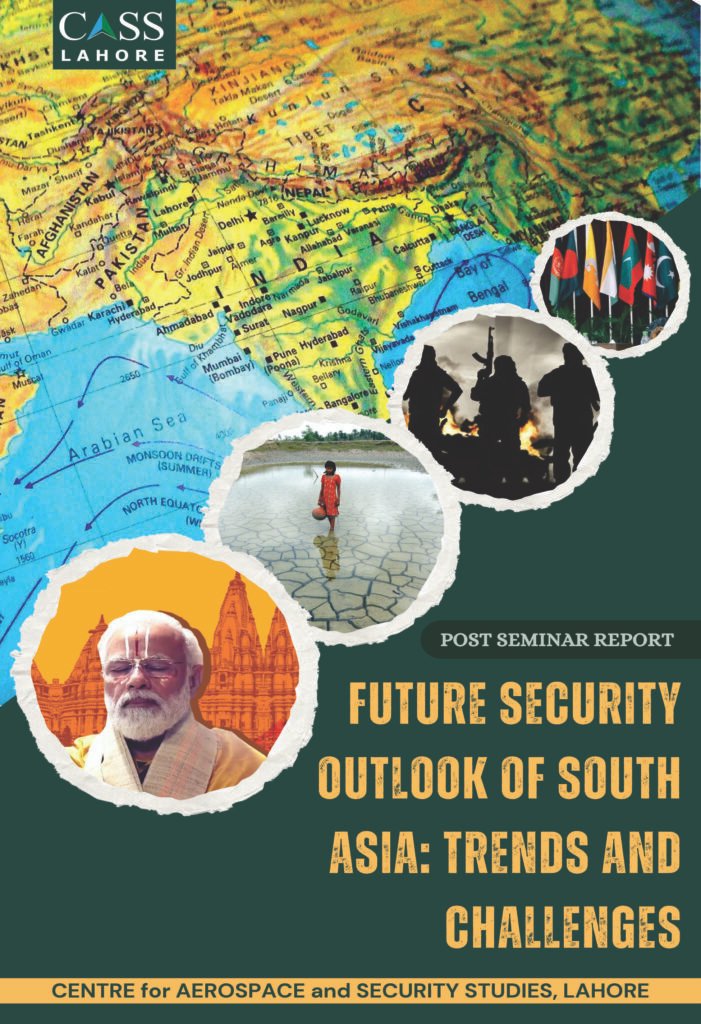
Future Security Outlook of South Asia: Trends and Challenges
July 11, 2024
PRESIDENT
Air Marshal Asim Suleiman (Retd)
SEMINAR COORDINATOR
Ameer Abdullah Khan
MASTER OF CEREMONY
Mehroo Waqas
Executive Summary
The seminar titled “Future Security Outlook of South Asia: Trends and Challenges”, hosted by the Centre for Aerospace & Security Studies (CASS), Lahore, provided a comprehensive analysis of the multifaceted security dynamics shaping South Asia. The event featured addresses from distinguished speakers, including Ambassador Aizaz Ahmad Chaudhary (Retd), Dr Khuram Iqbal, and Dr Farhan Siddiqui, who shared their insights on both traditional and non-traditional security challenges.
Mr Ameer Abdullah Khan, Senior Researcher at CASS Lahore, welcomed attendees and highlighted the complex interplay of traditional and non-traditional security challenges in South Asia. He emphasised the protracted Pakistan-India conflict over Kashmir, the rise of extremism, and the socio-economic factors undermining regional stability. Environmental challenges and the proliferation of cyber threats and emerging technologies were also noted as critical issues.
The keynote address by, Ambassador Aizaz Ahmad Chaudhary (Retd) provided a comprehensive analysis of the evolving security landscape in South Asia, framed within the broader context of global geopolitical shifts. He highlighted the transition to a multipolar world with several emerging centres of power, emphasising the rise of unilateral approaches by global leaders and the decline of multilateralism. The resurgence of narrow nationalism, anti-immigrant sentiments, protectionist trade policies, and the global rise of xenophobia and Islamophobia were identified as significant trends affecting international relations and security. These global dynamics create a more fragmented and contentious international environment, influencing regional stability in South Asia.
Focusing on the theatres of global contestation, Ambassador Chaudhary discussed the United States-China competition, the conflict in Ukraine, the strategic importance of the Indian Ocean, and the evolving dynamics in the Middle East. He explained how the US-China rivalry impacts South Asia through strategic alignments, with India partnering more closely with the US while China deepens ties with Pakistan. The Ukraine conflict, seen as a proxy war involving major powers, raises critical questions about territorial integrity and pre-emptive actions. In the Indian Ocean, India’s maritime strategy and its implications for regional security were underscored, along with the significant transformations in the Middle East, such as the Saudi-Iran rapprochement brokered by China.
Ambassador Chaudhary also addressed the complex regional dynamics, including the dysfunctional state of SAARC and India’s shift towards alternative regional frameworks like BIMSTEC. He analysed Pakistan’s bilateral relations with Afghanistan, Bangladesh, and Iran, highlighting the challenges and opportunities in each case. The importance of addressing non-traditional security threats, such as climate change, cyber warfare, and emerging technologies, was emphasised as critical for ensuring regional stability. Ambassador Aizaz provided a comprehensive, albeit concerning, overview of the security challenges Pakistan faces as a result of Indian actions and policies. His address underscored the necessity of a multifaceted approach to navigate the complex and interconnected security challenges confronting South Asia at both global and regional levels.
Dr Khuram Iqbal delivered a comprehensive address on the comprehensive security challenges facing South Asia, particularly focusing on the implications of India’s evolving strategic culture under Prime Minister Narendra Modi. He highlighted the significant shift towards saffronisation, where Hindu nationalist ideology, primarily propagated by the Rashtriya Swayamsevak Sangh (RSS), has increasingly influenced India’s governance and policy-making. This shift has led to an aggressive and assertive stance in India’s domestic and foreign policies, with a notable impact on regional stability and security.
Dr Iqbal detailed the implications of this transformation, including the dominance of RSS-minded individuals in key strategic institutions, the militarisation of Indian society through initiatives like the Agnipath scheme, and potential changes in India’s nuclear doctrine. He highlighted how these developments contribute to India’s aggressive posturing, heightened tensions, and the destabilisation of regional security dynamics. Additionally, he discussed India’s role in supporting terrorism to undermine Pakistan, its hegemonic ambitions, and the adverse effects of its policies on regional economic cooperation and integration.
In light of these mounting challenges, Dr Iqbal provided strategic policy recommendations for Pakistan. He called for a re-evaluation of South Asian policy, leveraging civilisational linkages with Central Asia, and normalising relations with Afghanistan. He emphasised the need to expand Pakistan’s deterrence spectrum, ensure the security of Chinese investments, recognise the strategic potential of the ocean, and increase civilian representation in strategic policy-making. These measures, he argued, are essential for Pakistan to effectively navigate the complex and evolving regional landscape and safeguard its national security interests.
Dr Farhan Siddiqui’s talk provided a comprehensive analysis of the key conflicts in the region, focusing on the India-Pakistan and Pakistan-Afghanistan dyads. He began by challenging the prevailing bias in international relations that favours conflict over peace, using a powerful quote from the anti-Vietnam War protests to illustrate this point. Dr Siddiqui argued that peace is often viewed as unachievable, while conflict is seen as inevitable, a mindset that needs to be decolonised for effective peace-building.
In his analysis of the India-Pakistan conflict, Dr Siddiqui highlighted the significant structural changes post-August 2019, particularly India’s revocation of Jammu and Kashmir’s special status, which has intensified local alienation and regional tensions. He criticised both India’s strategy of treating Kashmir as a domestic issue and Pakistan’s efforts to internationalise the conflict, noting that neither approach is likely to succeed. He proposed three possible future scenarios: a new crisis, back-channel talks, and limited cooperation, emphasising that while a new crisis is most probable, back-channel talks, though least likely, would be the most productive.
Turning to the Pakistan-Afghanistan conflict, Dr Siddiqui discussed the impact of the Taliban’s takeover in August 2021 and the enduring dispute over the Durand Line. He pointed out the paradoxes in Pakistan’s Afghan policy and the increased security challenges posed by cross-border terrorism. He called for a major policy rethink by Pakistan to address these issues coherently. In conclusion, he stressed the need for a paradigm shift towards peace and stability, advocating for renewed dialogue and a focus on pragmatic, cooperative strategies to resolve the region’s deep-rooted conflicts.
The seminar concluded with closing remarks from Air Marshal Asim Suleiman (Retd), President, CASS, Lahore, who encapsulated the key insights and outlined the path forward for enhancing regional security and cooperation. He highlighted the multifaceted security challenges facing South Asia, including traditional threats from India’s aggressive policies and non-traditional threats like climate change and emerging technologies. President, CASS Lahore, underscored the importance of economic development, continuous assessment of regional trends, and leveraging opportunities for constructive dialogue and cooperation to enhance regional security and stability. He emphasised that while the journey towards lasting peace is arduous, it is achievable through unwavering determination and collaborative efforts.
Guest Speakers
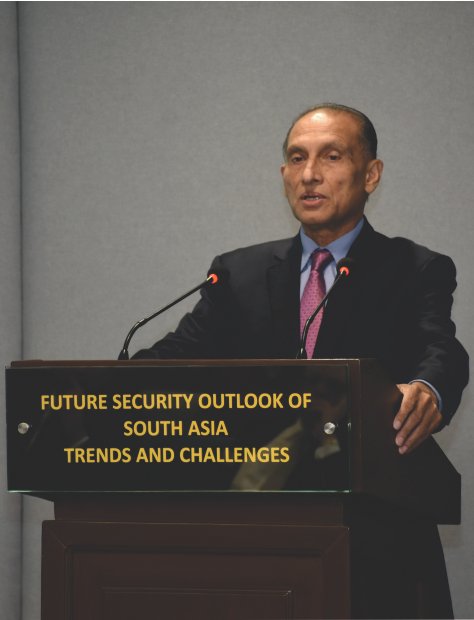
Amb Aizaz Ahmad Chaudhry
Former Foreign Secretary
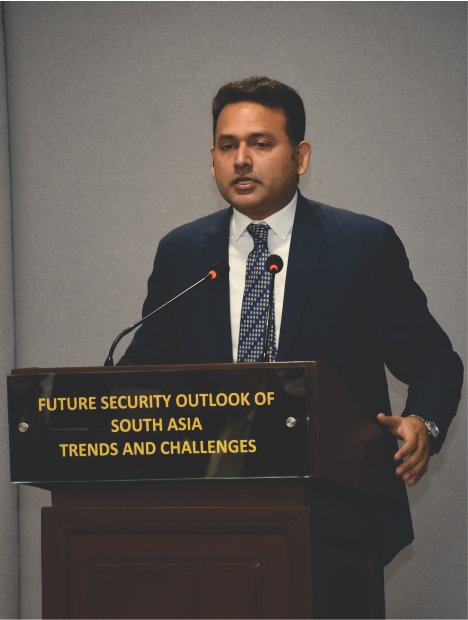
Dr Khuram Iqbal
Associate Professor, National Defence University
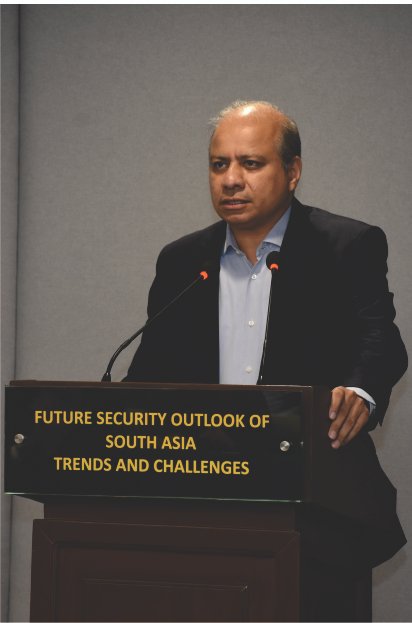
Dr Farhan Hanif Siddiqui
Associate Professor, Quaid-i-Azam University, Islamabad
CASS Speakers
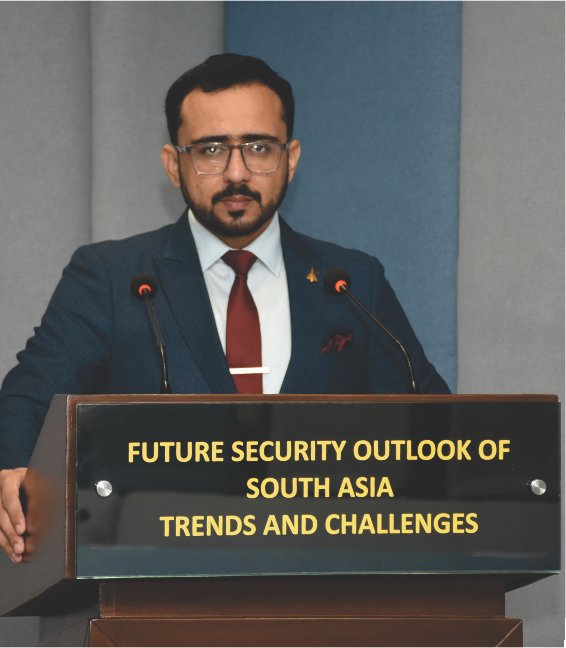
Ameer Abdullah Khan
Senior Researcher, CASS Lahore
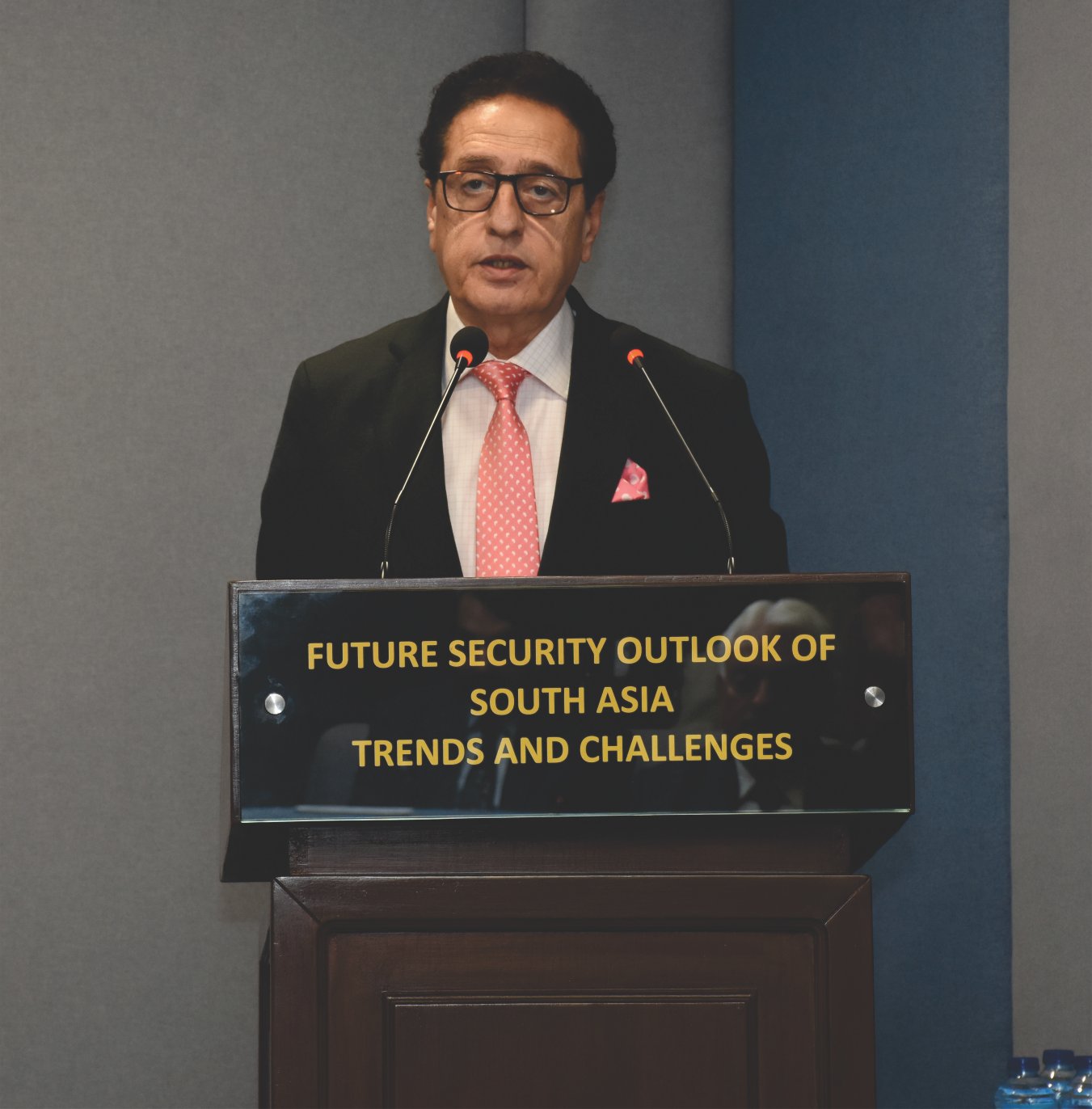
Air Marshal Asim Suleiman (Retd)
President, CASS, Lahore
CASS LAhore

The Centre for Aerospace & Security Studies (CASS) was established in July 2021 to inform policymakers and the public about issues related to aerospace and security from an independent, non-partisan and future-centric analytical lens.


